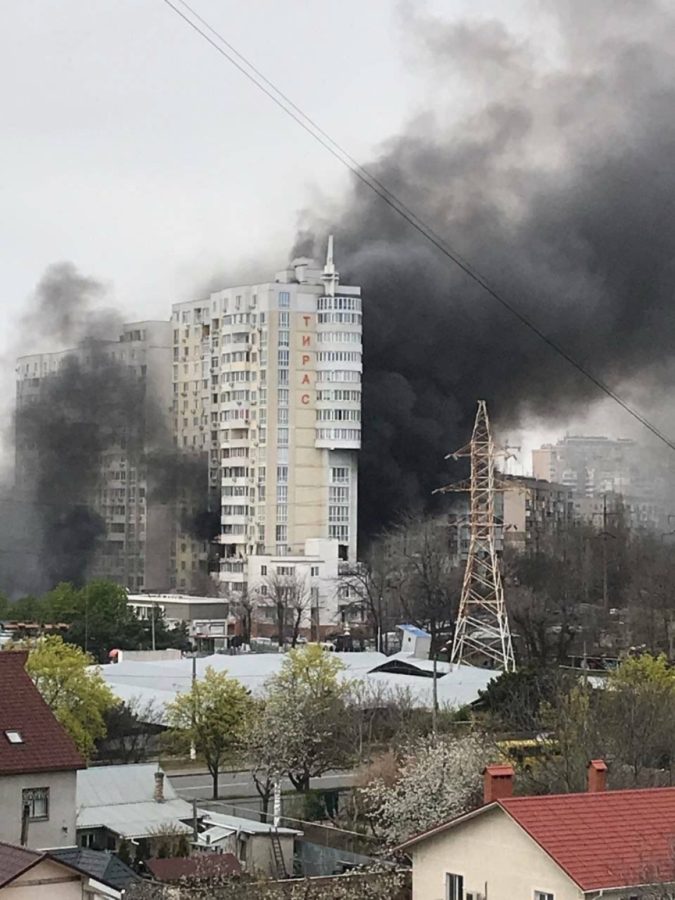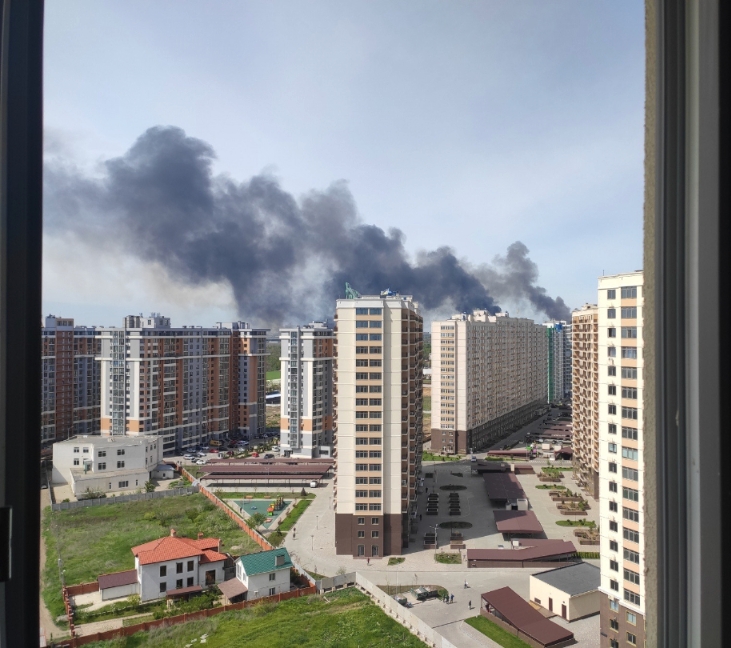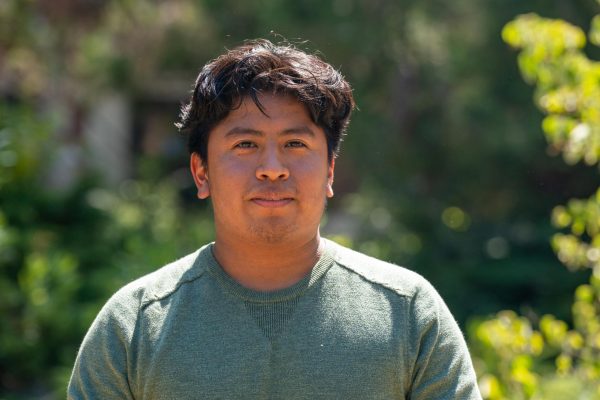The first explosions woke her up in the city of Dnipro, Ukraine, around 5 a.m. “Where is my daughter? Is she safe now?” she thought.
Everyone in her apartment building started texting and calling in a panic.
Anna Tereshchenko, 33, and her daughter Yeva, 12, rushed to her mother’s house, where they hid in her basement, hearing explosions overhead. “The bombs were everywhere,” said Anna. Ten days later, on March 5, Anna and Yeva emerged from the basement and boarded a train to Poland.
They were two of more than 7 million refugees who have fled Ukraine since Russia invaded the country on Feb. 24. Many have found their way to California and some to Santa Rosa Junior College. Through programs like “Uniting with Ukraine,” refugees like Anna receive help to apply for work visas, enroll in schools and find housing. However, leaving her home behind and getting to America was a difficult journey full of loss and recovery for Anna and other new SRJC students.
After a brief stay in Poland, Anna and Yeva lived in Turkey for three months before hearing from friends that Ukraine was “not so dangerous.” They returned to Ukraine in June, and the mood had changed. Questions such as “How are you doing?” were now frequent amongst neighbors, and the usually stoic Ukrainians had begun to open up and be friendlier to each other.
However, explosions had become the norm, and Anna realized that for her daughter’s sake, she could not stay in Ukraine. With the help of a sponsor family, she flew to San Francisco and began a new life in Sonoma County.
Over in the city of Odesa, Yana Kalmykova, 34, received a call from her father-in-law that Russia had begun bombing Ukraine in the early morning of Feb. 24. Within hours she, her husband Yehor, 35, and their son Dima, 5, could see the rockets exploding two miles from their 13th-floor apartment. “When it started, you don’t understand. Your mind, don’t understand,” Yana said. “From there, it was a blur.”
Yana described a newfound sense of community that formed with her neighbors. “We were going to underground parking, and we used this like a safe space. All of our neighbors, we met. It was very often. It could be four, five times a day,” Yana said.
The neighbors created a group chat to keep in touch with one another. Yana, Yehor and Dima had to sleep in the family car in the underground lot for the first few days.
The decision to leave was not easy. Yehor gave Yana and Dima one evening to collect their things and go. “Because it’s not safe there. And Dima, I don’t want my son to see a bomb, or someone die. I want my wife and my son in a safe place,” Yehor told her.
The family scrambled to gather what they could, such as documents and clothes. Yana and Dima traveled by train to Bucharest, where they stayed for one month. Yana found a sponsor family on Facebook, whom she messaged and video chatted with about needed documents and the process of moving to America.
Yehor was not allowed to leave with them, as Ukrainian President Volodymyr Zelenskyy required for all men between the ages of 18 and 60 to stay in the country and fight the war. Yehor stayed in Ukraine for eight months, as he waited for a legal permit to leave the country. Once it was issued, he joined his family in Santa Rosa in September. Yehor “never belonged to the military,” Yana said.
Landing in Sonoma
Anna has been away from her home for nine months, and for her, Sonoma County has been nothing but a positive experience. “Everyone asks, ‘How are you doing?’ Everyone smiles. It’s very nice,” she said as she described her day-to-day routine.
Now that she is here, Anna wants to work on her English. She takes ESL classes at SRJC’s Southwest Center and hopes to improve her English so she can find work here. In Ukraine, she developed websites for an international technology company and wants to do similar work in America.
Anna is uncertain about where she plans to live in the future. “When I came here, I was sure I would go back. And now I’m talking every day with my mom, with my friends who say ‘Stay there. You should stay,’” Anna said. Her biggest concern is keeping her daughter safe and in school.
Anna worries about family, including her mother, Iryna, 64, who is still in Ukraine. “Many people don’t have a choice,” she said. “For example, for men, it’s forbidden to leave the country, because of the military situation. Many families stay because of this. They don’t want to leave their fathers, brothers, husbands.”
Yana shared both Anna’s fear for those left behind and her gratitude for her welcoming experiences so far in California. “Very nice people everywhere, and everyone wants to support you. Here, it’s different than people in our country because everybody wants to smile when you see somebody, and everyone wants to tell you good morning,” she said.
Yana and Yehor keep in touch daily with their family and friends still in Ukraine. “I just go to my mom and I ask her ‘How are you?’ and she told me ‘I’m still alive,’” Yana said, noting her mother’s sense of humor helped her relax. “I think it was a good thing for me.”
Yana also talked about the electricity in Ukraine being shut down, which led to people losing their jobs.
Yana’s sponsor family helped her find classes at the Southwest Center, where she hopes to improve her English, so she can continue working as an animator, her job in Ukraine.
SRJC ESL instructor Daniela Kingwill has Anna, Yana and Yehor in her ESL 715 class, and teaching them has affected her as an instructor. “It makes it so much more real, when you know people who are living through it,” Kingwill said.
As a non-credit ESL teacher, Kingwill said it’s not only her job to teach English, but also to help with issues such as cultural norms and paperwork like driver’s licenses or school documents.
“Sometimes it’s as basic as helping with a quick phone call or making an appointment online, or just something cultural that we’re all used to here but are big hoops for them to jump through,” Kingwill said.
“Everyone loves her; she’s very active, she’s great,” Yana said of Kingwill.
“Our teacher for English is very very nice,” Yehor said.
The Southwest Center has a long history of supporting immigrants from all over the world, according to Hector Delgado, who oversees daily operations. He said the center not only offers ESL classes but also helps students assess the appropriate English classes they should take, meet with immigration attorneys, register for classes and apply to colleges. Non-credit ESL classes do not yield college credit, however they don’t require citizenship to enroll.
“Some [students] will be quite successful, and they transfer within one or two semesters to credit classes,” Delgado said of the program.
Delgado is proud of the Southwest Center and all of the aid staff can offer immigrants and refugees alike. “This country is a beacon of hope. The beacon of hope for the world to look at it as a place where they can find peace,” Delgado said.
He hopes people will see the Southwest Center as a “human college,” and this will attract more people to the campus.
Anna and Yeva have adjusted well to Sonoma County. Anna is slowly conquering the language barrier and has some free time now that she has her work visa. Yeva loves school, particularly because she has less homework compared to Ukraine. She is outgoing and has made many friends, Anna said.
Yana, Yehor and Dima are also enjoying their time here. Dima is a student at Santa Rosa Charter School for the Arts. He started learning English in Ukraine, so he was able to quickly adapt.
The transition to living in a new country was difficult for him during the first couple of months, but he now understands English well and has made new friends. Eventually, the family plans to move near Los Angeles so Yehor can study programming full-time. Yana still hopes to find a job in animation as well. They do not plan to return to Ukraine in the near future, mostly because of uncertainty as to when the war will end.





